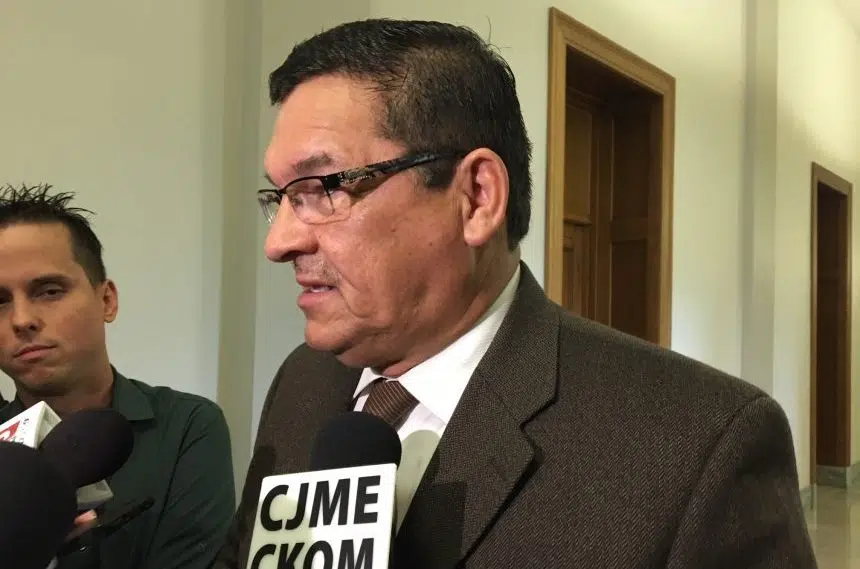Saskatchewan’s NDP opposition says when it comes to addressing high rates of Indigenous children in foster care, communities and families deserve more than “nice words” from the government.
NDP Social Services Critic Carla Beck joined First Nations and Métis Critic Buckley Belanger Wednesday to call on the government to make comprehensive reforms to the child welfare system.
“This is an issue that with the status quo – with promises by the government but not backing them – is getting worse,” Beck said.
Protestors with the Justice for our Stolen Children Camp outside the legislature have been calling on the government to take action on the same issue for months. Following a meeting on July 2, the government laid out a response to a list of ‘actionable items’ requested by the camp. The response from the province outlined work it is already undertaking through partnerships with First Nations Tribal Councils to care for Indigenous children in the community.
Beck said the government has been making promises to review and address these issues since 2010, but the proportion of Indigenous children in foster care has actually increased from 67 per cent to 72 per cent since 2013.
“It’s time to stop talking about it, actually listen to the communities and start finding solutions,” Beck said.
One of the ideas put forward by the NDP is the creation of an Indigenous Children and Youth Advocate to specifically focus on co-ordinating welfare services for children living on reserves. This would eliminate jurisdictional issues that crop up from time to time with the current provincial children’s advocate. Beck said this is a role suggested and supported by current Children’s Advocate Corey O’Soup and the Federation of Sovereign Indigenous Nations (FSIN).
The NDP is calling for a shift in focus towards providing more supports to keep kids with their families by addressing root causes of why they are taken away in the first place.
Despite the government’s stated position that there are in-home supports in place and apprehending children is a last resort for safety, Beck said the NDP is hearing those supports are minimal compared to those offered after a child is in the system.
“What we are talking about is a shift in focus and prevention so that more of those kids that can be safely kept in their homes and communities can enjoy that right to grow up with their families,” Beck said.
She said parental aides, supports for victims of domestic violence, housing and mental health and addictions services are specific resources that could improve outcomes for struggling families.
Belanger said these changes are advocated by organizations like the FSIN and Métis Nation who would like to have a role in finding solutions.
When asked if this isn’t already happening through the partnerships referenced by the government, Belanger said no.
“I think what’s happening is the province has resisted full discussion,” he said.
From his perspective working with northern and First Nations communities, Belanger said there is a need for better wrap-around services.
“As you look at the community as a whole – and I think this is what the FSIN and the Métis Nation is trying to do – they are telling people: ‘look, we are part of the solution, but we must have the resources on the ground in our communities to strengthen the entire community, strengthen the entire family structure and this is the reason why we want to be part of the process,’” Belanger said.
He added the province can’t “arrest their way out of these issues,” referring to the government’s push to have the protest camp removed by police.
Province cites co-operation with Indigenous groups
The Ministry of Social Services provided a written statement in response to the calls for reform from the NDP.
The statement said it is vital for all children to have access to an independent advocate and the ministry respects the work the work the children’s advocate has done across the province. It noted specifically that Corey O’Soup is the first Indigenous children’s advocate in the provinces’ history.
The ministry went on to state it is working with stakeholders including Indigenous leaders to improve the well-being of children.
“Since 2007, the Saskatchewan government has increased funding to First Nations Child and Family CBOs by 453 per cent.”
The province clarified its commitment to addressing the over-representation of Indigenous children in foster care, saying it has made significant strides in supporting families to stay together, but the percentage remains high.
It also reiterated the importance of having First Nations communities provide their own child protection and welfare services, noting the 17 different agreements with First Nations Child and Family Service agencies to deliver those services on-reserve and three to deliver it off-reserve.
The government also said Saskatchewan is one of the leading jurisdictions in Canada for placing children with extended family members at a rate of 60 per cent.











